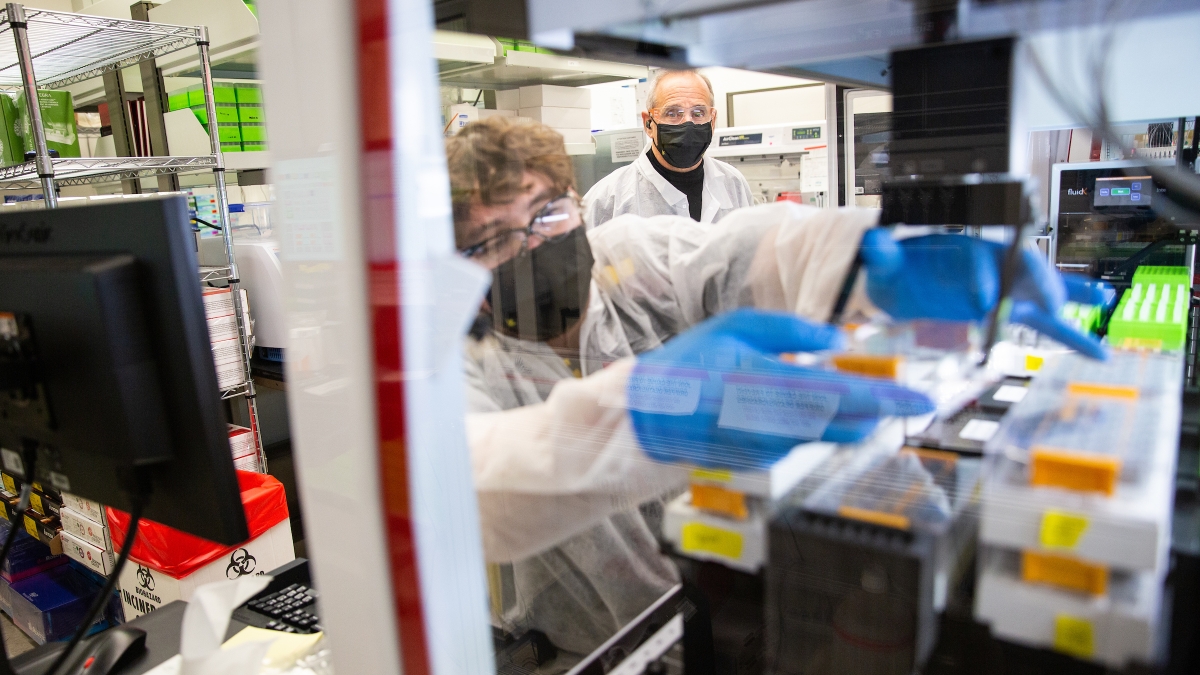ASU joins prestigious Association of American Universities

Researchers work in the ASU Biodesign COVID-19 Testing Lab on the ASU Tempe campus on Dec .16, 2020. Photo by Deanna Dent/ASU
Editor’s note: This story is featured in the 2023 year in review.
Arizona State University on June 1 was selected to join the prestigious Association of American Universities, which comprises the nation’s elite research universities.
The AAU added Arizona State into its membership, applauding the university’s academic and research strength and acknowledging its place as a leader in higher education. There now are 71 universities — including two from Canada — in the association, which was established in 1900.
“From deep space to deep in the oceans, we are a university designed for discovery, interdisciplinary research and innovation,” ASU President Michael Crow said. “As one of the fastest-growing research enterprises in the United States, we are focused on solving society’s greatest challenges, and we are excited to become part of the AAU.”
Members of AAU, including stalwart private universities like Harvard, Stanford, MIT and Johns Hopkins and leading public universities like UCLA, the University of Washington, the University of Wisconsin-Madison and the University of Michigan, collectively help shape policy for higher education, science and innovation; promote best practices in undergraduate and graduate education; and strengthen the contributions of leading research universities to American society.
As a group they earn a majority of competitively awarded federal funding for research that improves public health, addresses national challenges and contributes significantly to the nation’s economic strength, while educating and training visionary leaders and innovators.
ASU’s rapid growth in research
During the past two decades, ASU has increased the scale and scope of its research activity nearly six times over. The university has become an innovation powerhouse of leading researchers and transdisciplinary schools making an impact on local and global communities.
With $677.7 million in expenditures in fiscal year 2021FY 2021 is the most recent year available in the HERD rankings. , ASU ranked sixth among 750 institutions without a medical school, according to the National Science Foundation’s annual Higher Education Research and Development rankings. ASU also ranked sixth in spending of NASA funding, according to the HERD report.
This year, for the eighth year in a row, U.S. News & World Report named ASU the most innovative school in the U.S. ASU also ranks in the top 15 worldwide for U.S. utility patents issued in 2022, and more than 200 companies have been launched based on ASU innovations, attracting more than $1.2 billion in external funding.
In the research labs across ASU’s campuses one can access images coming back from space, one can study the latest data on the health of coral reefs, one can find researchers who quickly pivoted their work to develop a widely used saliva-based COVID-19 test, or one can meet scientists who are working to pull carbon dioxide from the air.
“ASU has achieved a true continuum of research across the arts, humanities, social sciences, natural sciences, engineering and technology. From Early Career NSF award winners to pan-university transdisciplinary approaches, we are tackling problems from all dimensions,” said Sally C. Morton, executive vice president of Knowledge Enterprise at ASU. “What these successes all have in common is the discovery of use-inspired solutions to the most pressing issues of the day, issues that meet the needs of our community.”
Students play a key role in this research, directly involved as part of teams that work on developing and building instruments for space missions or exploring the new scientific approaches that recently helped land a $90 million NSF grant to build the first compact X-ray free electron laser.
The impact of joining AAU
AAU membership signals that ASU is a national leader in research and academics. Membership is by invitation only based on an extensive set of quantitative indicators that assess the breadth and quality of a university’s research and education.
ASU focuses on egalitarian access to higher education, measured not by whom it excludes, but by whom it includes and how they succeed. It also is notable that ASU joins the AAU as a Hispanic-Serving Institution.
“We are particularly proud that two of our new members — Arizona State and UC-Riverside — are designated as Hispanic-Serving Institutions because significant shares of their student bodies are composed of individuals from Hispanic backgrounds,” AAU President Barbara Snyder said. She added that the association looks forward to working with the new members “to continue advancing higher education and laying the scientific foundation that helps keep our economy strong and our nation healthy and safe.”
“This is an important day for Arizona State University,” Crow said, “and for the maturation of our university.”
More University news

ASU ocean degrees now eligible for Western Undergraduate Exchange
Scholarship opportunities are essential for Arizona State University to enable academic excellence and accessibility at scale.In that spirit, ASU’s College of Global Futures, a unit of the …

ASU endowment ranks in top 100 for its asset size
The Arizona State University endowment reached $1.59 billion in assets at the end of fiscal year 2024 and rose eight spots on the industry’s top 100 list that ranks endowments by asset size.The…

ASU guarantees pathways to admission for LA-area students impacted by wildfires
Thousands of Los Angeles-area high school students whose families have been uprooted by the devastating recent wildfires can rest a little easier about at least one thing during this difficult time…

